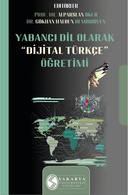Explore

Yabancı Dil Olarak Dijital Türkçe Öğretimi
Ali NACAKÇIOĞLU, Aliye Nur ERCAN GÜVEN, Alparslan OKUR (editor), Ata ATAK, Aysun EROĞLU, Burcu KOÇ, Deniz DEMİRCİOĞLU DİREN, Elif BOZYİĞİT, Eliz ALPER, Erdal ÖZCAN, Ezgi İNAL, Gökçen GÖÇEN, Gökhan ARI, Gökhan Haldun DEMİRDÖVEN (editor), Haluk GÜNGÖR, Hatice YURTSEVEN YILMAZ, İbrahim DUMAN, Lamia Büşra YEŞİL, Mehmet Barış HORZUM, Melike ERDİL, Murat TOPAL, Mustafa Serdar YAŞAR, Nahide İrem AZİZOĞLU, Ozan İPEK, Ömer Faruk ÇANGIR, Safa EROĞLU, Seda DEMİR, Yasin ÜNGÖREN, Yunus ŞENYİĞİT, Zeynep EROĞLU, Süleyman DEMİR, Rabia GÜRBÜZ US
2023
0 Ungluers have
Faved this Work
Login to Fave
With the onset of integration of web technologies into our lives, a global transformation process has been triggered and traditional approaches have tended to evolve into digital organisms as a past aspect of the millennium line. The one-way information transfer process, which was activated with the Web 1.0 era, took root on the basis of content sharing and 'collaboration' with Web 2.0, and was characterized in a 'smart' and 'individualized' form with the Web 3.0, and eventually ended up searching for an artificial intelligence-oriented direction. The developments in machine learning, deep learning, and natural language processing algorithms, on the other hand, were crowned with the Web 4.0 technology, and the artificial intelligence-based virtual reality atmospheres became the center of attention as the new phenomenon of digital. As far as the relevant perspective is concerned, it is possible to say that today's modernization standards are shaped within the framework of technology. While the parameters of the 'new generation world' are built on the digital plane, the 'new generation of people' generations develop specifically in the skills of this plane.
This book is included in DOAB.
Why read this book? Have your say.
You must be logged in to comment.
